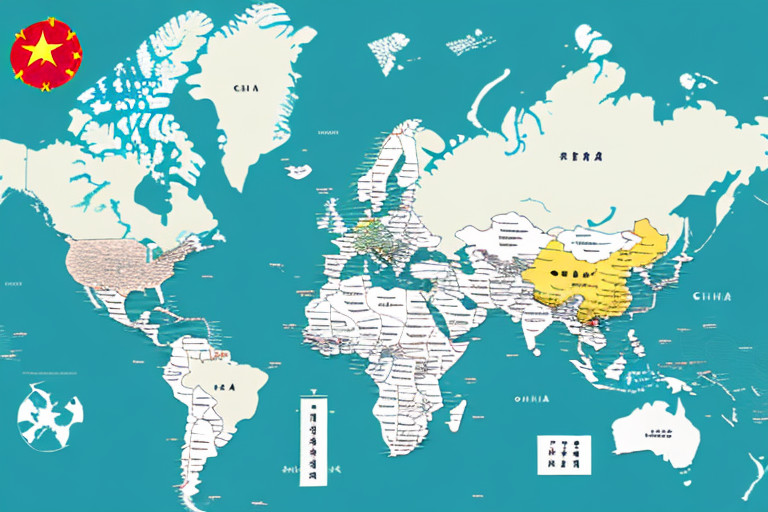Understanding UPS Shipping Rates to and from China
If you need to transport goods internationally, shipping with UPS is one of the most reliable and efficient options available. However, understanding the intricacies of UPS shipping can be challenging, especially when dealing with shipments to and from China. In this article, we’ll provide a comprehensive guide on UPS shipping rates to and from China, covering everything from cost calculation to common issues and best practices.
The Basics of Shipping with UPS
Before diving into the specifics of shipping to and from China, it’s essential to understand the fundamentals of UPS shipping. UPS offers a variety of shipping options, including ground, air, and ocean transportation, as well as different types of services like express shipping and freight. In general, UPS shipping rates are determined based on several factors:
- Package Weight: The heavier the package, the higher the shipping cost.
- Package Dimensions: Larger packages may incur additional charges.
- Destination: Shipping rates vary depending on the destination zone.
- Service Level: Faster delivery services like express shipping cost more.
Additionally, UPS provides additional services to enhance the shipping experience. These include scheduling pickups from your home or office, dropping off packages at UPS locations, real-time tracking through the UPS website or mobile app, and packaging supplies to ensure your items are protected during transit.
Shipping Rates Explained: What You Need to Know
UPS shipping rates are calculated using a comprehensive formula that considers various factors. The most critical factor is the weight of your package. Heavier packages generally cost more to ship. UPS also employs a zoning system that divides the world into different geographic regions, with shipping rates varying for each zone.
Another significant factor influencing shipping rates is the type of service you select. UPS offers several shipping options, ranging from standard ground shipping to expedited air shipping. Naturally, the faster you need your package delivered, the higher the shipping cost will be. When selecting a shipping service, it’s essential to balance your delivery timeline with your budget.
How UPS Calculates Shipping Rates for China
Shipping to and from China introduces additional complexities due to factors such as distance, customs regulations, and local taxes. UPS determines shipping rates for China by considering:
- Package Weight and Dimensions: As with all international shipments, heavier and larger packages cost more to ship.
- Destination: China is divided into multiple zones, each with different rate structures.
- Shipment Type: Whether the shipment is urgent, standard, or freight impacts the cost.
Furthermore, UPS takes into account the value of the items being shipped. China imposes specific regulations and taxes on imported goods based on their value. UPS provides expertise to navigate these regulations, ensuring your shipment is properly valued and taxed. Consulting with UPS before shipping to China can help ensure you have all necessary documentation and information.
Factors that Affect UPS Shipping Rates to and from China
Apart from weight and destination, several other factors can influence UPS shipping rates to and from China:
- Fuel Prices: Fluctuations in fuel costs can impact shipping rates.
- Currency Exchange Rates: Changes in exchange rates can affect the cost of international shipping.
- Customs Duties: Additional fees may apply based on the nature and value of the goods being shipped.
- Type of Goods: Certain items, such as hazardous materials or products requiring special handling, may incur extra charges or face shipping restrictions.
Understanding these factors is crucial for accurate cost estimation and effective shipment planning.
UPS Shipping Zones: What They Are and How They Affect Your Costs
UPS utilizes a zoning system to determine shipping rates. This system divides the world into various geographic regions or zones, each with its own rate structure. When shipping to and from China, knowing which zone your package belongs to can significantly impact your overall shipping costs.
UPS periodically updates its shipping zones based on changes in logistics and transportation infrastructure. Therefore, it's vital to stay informed about any zone updates that may affect your shipments. Additionally, certain items may be restricted or prohibited from being shipped to specific zones, so always verify with UPS or consult the destination country's customs regulations before sending your package.
Comparing UPS Shipping Rates with Other Carriers
When selecting a shipping carrier for your China shipments, comparing different options is essential to find the best rates and services. While UPS is a prominent and reliable choice for international shipping, other carriers such as DHL, FedEx, and the United States Postal Service (USPS) offer competitive alternatives.
DHL: Known for its strong presence in Asia, DHL provides a range of services, including express and economy shipping, with a reputation for fast and dependable delivery. However, DHL's rates can sometimes be higher compared to other carriers.
FedEx: FedEx offers a global network and various shipping options, including air and ground services, as well as customs clearance and package tracking. Similar to DHL, FedEx's rates may be higher, making it essential to compare prices and services to determine the best fit for your shipping needs.
USPS: The United States Postal Service can be a cost-effective alternative for certain types of shipments, although it may not offer the same level of tracking and speed as UPS, DHL, or FedEx.
When comparing carriers, consider factors such as delivery speed, tracking capabilities, customer service, and overall cost to determine the best option for your specific needs.
How to Save Money on UPS Shipping to and from China
Optimizing your UPS shipping costs to and from China involves strategic planning and leveraging available resources. Here are some effective strategies to reduce shipping expenses:
- Efficient Packing: Pack your items as efficiently as possible to minimize weight and dimensions, which can lower shipping costs.
- Appropriate Service Selection: Choose the shipping service that aligns with your delivery timeline and budget. Sometimes, opting for a slightly slower service can result in significant savings.
- Take Advantage of Discounts: UPS offers discounts and promotions for frequent shippers. Setting up a UPS account can provide access to special rates and benefits.
- Consider Freight Forwarding: Using a freight forwarding service can consolidate multiple shipments into a single, larger shipment, reducing overall costs.
Additionally, being aware of additional fees or taxes, such as customs duties or value-added taxes (VAT), is crucial. By understanding these costs upfront and incorporating them into your shipping budget, you can prevent unexpected expenses and ensure cost-effectiveness.
Tips for Packing and Preparing Your Shipment with UPS
Proper packing and preparation are vital to ensure that your UPS shipments to and from China arrive safely and on time. Here are some essential packing tips:
- Use High-Quality Packaging: Employ sturdy, high-quality packaging materials to protect your items during transit.
- Clear and Accurate Labeling: Clearly label your packages with accurate information to prevent misrouting or delays.
- Proper Cushioning: Utilize cushioning materials like bubble wrap or packing peanuts to safeguard your items from damage.
- Avoid Overpacking: Do not overpack boxes, as excessively heavy or bulky packages can incur additional fees or handling difficulties.
- Select the Right Shipping Option: Choose the UPS shipping service that best fits your needs, considering factors like delivery speed and cost.
Ensuring your shipment is well-prepared will not only protect your goods but also facilitate smoother customs clearance and faster delivery.
Tracking Your Shipment: What You Need to Know
Tracking your UPS shipment is crucial to monitor its progress and stay informed about its delivery status. UPS provides various tracking options, including:
- Online Tracking: Use the UPS website to track your package in real-time.
- Text and Email Notifications: Receive updates via text messages or emails regarding your shipment's status.
- Mobile Apps: Utilize the UPS mobile app for convenient access to tracking information on the go.
Setting up a tracking system in advance allows you to be proactive in managing your shipment. However, be prepared for potential delays or unexpected issues during the delivery process. In such cases, maintaining open communication with UPS can help resolve issues promptly.
Additionally, ensure you have all necessary information, such as your tracking number and shipping address, readily available. This will facilitate quick access to your shipment's status and confirm it is being delivered to the correct location.
Common Issues with UPS Shipping to and from China and How to Avoid Them
Despite UPS's reputation for reliability, certain issues can arise when shipping to and from China. Some common problems include:
- Customs Delays: Shipments may experience delays during customs clearance due to documentation issues or regulatory inspections.
- Mislabeled Packages: Incorrect labeling can lead to misrouting or delayed deliveries.
- Unexpected Surcharges: Additional fees may be applied if shipments do not comply with customs regulations or packaging standards.
To mitigate these issues:
- Double-check all documentation and labels to ensure accuracy.
- Communicate clearly with your UPS representative to address any concerns promptly.
- Plan your shipments well in advance to accommodate potential delays.
Understanding Customs Clearance Procedures for UPS Shipments in China
Customs clearance is a critical component of international shipping, and it plays a significant role in determining your UPS shipping rates to and from China. All shipments entering or leaving China must go through customs clearance, which involves a detailed and often lengthy process. Key aspects to consider include:
- Documentation: Accurate and complete documentation is essential for smooth customs clearance. This includes commercial invoices, packing lists, and any required permits or certificates.
- Procedures: Familiarize yourself with the customs procedures and requirements specific to China to avoid unnecessary delays.
- Fees: Be aware of the applicable customs duties, taxes, and fees based on the nature and value of your goods.
Collaborating with UPS's team of experts can help navigate these complexities, ensuring that your shipments comply with all regulatory requirements and are processed efficiently.
Navigating International Trade Regulations with UPS
International shipping entails adhering to a myriad of trade regulations and standards to ensure compliance with local laws. UPS can assist in managing these regulations through:
- Documentation Assistance: UPS provides guidance on the necessary documents required for your shipments.
- Compliance Reviews: UPS can conduct compliance checks to ensure your shipments meet all regulatory standards.
- Training and Seminars: UPS offers training sessions to educate clients on international trade regulations and best practices.
Leveraging UPS's expertise in international trade can simplify the shipping process and reduce the risk of regulatory non-compliance.
Best Practices for Successful UPS Shipping to and from China
To ensure successful and efficient UPS shipping to and from China, consider implementing the following best practices:
- Plan Ahead: Early planning allows you to account for potential delays and manage your shipping schedule effectively.
- Clear Communication: Maintain open lines of communication with your UPS representative to address any issues promptly.
- Consistent Tracking: Regularly monitor your shipments to stay informed about their status and anticipate any handling requirements.
- Proper Packaging and Labeling: Invest in quality packaging materials and ensure accurate labeling to protect your goods and facilitate smooth customs clearance.
By adhering to these best practices, you can enhance the reliability and efficiency of your UPS shipments, minimizing disruptions and ensuring timely deliveries.




















